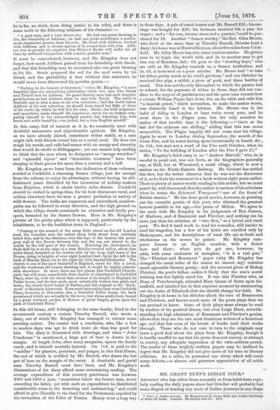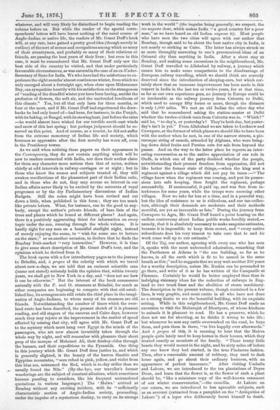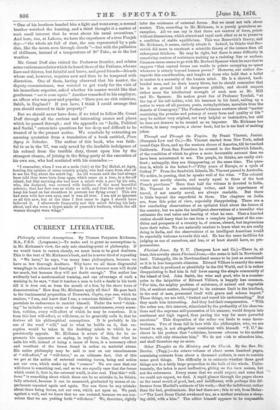MR. GRANT DUFF'S INDIAN TOUR.* ANYBODY who has either from
necessity or from habit been regu- larly reading the daily papers since last October will probably feel some disgust at hearing any more of Indian journeys in any shape
• Notes of Indian Journey. By Mountstuart E-Gmnt Duff, late Under-Secretary of State for India. London: Macmillan and Co. 1876.
whatever, and will very likely be disinclined to begin reading the volume before us. But while the reader of the special corre- spondents' letters will have learnt nothing of the usual course of Anglo-Indian or native life, the readers of Mr. Grant Duff's book will, at any rate, have gained a pretty good idea (though merely in outline) of the sort of scenes and occupations among which so many of their countrymen, and probably so many of their relations or friends, are passing the best years of their lives ; but even in this case, it must be remembered that Mr. Grant Duff only saw the beet side of the country he visited, and that under particularly favourable circumstances, as was naturalin the case of an ex.Under- Secretary of State for India. We who havehad the misfortune to ex- perience the eight months' almost continuous winter, from which we only emerged about a fortnight ago, when close upon Midsummer Day, can sympathise heartily with his satisfaction on the strangeness of "reading of the dreadful winter you have been having, amidst the profusion of flowers, the soft air, and the unclouded loveliness of this climate." Yes, but all that only lasts for three months, or four at the most, and if Mr. Grant Duff had experienced the draw- backs he had only heard of—had been, for instance, in the Punjab, with its baking, or Bengal, with its stewing heat, just before the rains —he would almost have wished for our terrible north-east winds and snow of this last spring ; but perhaps judgment should be re- served on this point. And of course, as a tourist, he did not suffer from the extreme monotony of Indian life and society, which becomes so oppressive after the first novelty has worn off, even in the Presidency towns.
As we said when noticing these papers on their appearance in the Contemporary, they do not contain anything which will be new to readers connected with India, nor does their author claim for them any character more serious than that of notes, written chiefly at odd intervals in railway-carriages or at night ; but in those who know the scenes and subjects treated of, they will awaken recollections of the pleasantest part of their Indian exile, and in those who do not, they may arouse an interest in our Indian affairs never likely to be excited by the accounts of royal progresses or by the dry Parliamentary discussions of Indian Budgets. Still the notes might have been revised and cut down a little, when published in this form ; they are too much like private letters. What, for instance, can be the good to any- body, except the author's private friends, of bare lists of the trees and plants which he found at different places? And again, there is a positively aggravating thirst for information on every topic under the sun, running through the whole volume. It is hardly right for any man on a beautiful starlight night, instead of merely enjoying the scene, to " wish for some one to lecture on the stars ;" or on another occasion, to declare that he finds the Bombay fruit-market "very instructive." However, it is time to give some short description of Mr. Grant Duff's tour, and the opinions which he derived from it.
The book opens with a few introductory pages as to the journey to Brindisi, and, a propos of the celerity with which we travel about now-a-days, we are told that an eminent scientific man (name not stated) seriously holds the opinion that, within twenty years, we shall get to New York in a day, and "does not see how it can be otherwise." But the interest of the book commences naturally with the P. and 0. steamers at Brindisi, for much as other companies are beginning to compete with that old-estab- lished line, its arrangements still retain the chief place in the imagi- nation of Anglo-Indians, to whom many of its steamers are old friends. Notwithstanding the number of times which the over- land route has been described, the present sketch of it is pleasant reading, and old stagers of the caravan and Cairo days, however much they may rejoice at the improvement in the matter of speed effected by missing that city, will agree with Mr. Grant Duff as to the mystery which must hang over Egypt in the minds of the passengers, who are now almost invariably taken through the whole way by night, and will remember with pleasure their short peep of the mosque of Mehemet Ali, their donkey-rides through the bazaars, and their expeditions to the Pyramids. One thing in this journey which Mr. Grant Duff does justice to, and which is generally slighted, is the beauty of the barren Sinaitic and Egyptian mountains, "seen robed in pink, yellow, and violet from this blue sea, misnamed the Red, which is to-day stiller-than we
,r. usually found the Nile." (By-the-bye, our traveller's former wanderings are the subject of constant allusions, which sometimes become puzzling to outsiders, like his frequent untranslated quotations in various languages.) The Malwa ' arrived at Bombay without any exciting incident, with its " sufficiently characteristic section of Anglo-Indian society, proceeding, ender the impulse of a mysterious destiny, to carry on its strange
work in the world" (the impulse being generally, we suspect, the res angusta domi, which makes India " a good country for a poor man," as we have heard an old Indian express it). Most people who have seen the two cities will agree with our author that Bombay, though said to be about the best native city in India, is not nearly so striking as Cairo. The latter has always struck us as more throughly answering to one's preconceived ideas of an Oriental city than anything in India. After a short stay at Bombay, and making some excursions in the neighbourhood, Mr. Grant Duff travelled to Allahabad by railway, a journey which causes him to make some comparisons to the disadvantage of European railway travelling, which we should ,think are scarcely deserved since the introduction of sleeping-cars, but which cer- tainly show that an immense improvement has been made in this respect in India in the last ten or twelve years, for at that time, as far as our own experience goes, no journey in Europe could be so intolerable as the railway journey from Calcutta to Delhi, which used to occupy fifty hours or more, though the distance is only 1,000 miles. We met an old Indian the other day who said that he remembered asking the station-master at Delhi whether the twelve-o'clock train from Calcutta was in. " Which?" said he, " to-day's, or yesterday's ? They're both due, but yester- day's isn't in yet." From Allahabad we are taken to Lucknow and Cawnpore, at the former of which places we should like to have been with the author when he met, in one of the narrow streets, a pic- turesque string of camels, attended by Afghans, who were bring- ing down dried fruits and Persian cats for sale from beyond the passes. And on the way to the latter place he reports an inter- esting conversation as to the native appreciation of our rule in Oudb, in which one of the party doubted whether the people, notwithstanding their present freedom from oppression, did not like better the former state of things,—when the king sent a regiment against a village which did not pay its taxes :—" The village knew when the regiment was coming, and put its posses- sions into safe keeping, then fought the regiment, perhaps successfully. If unsuccessful, it paid up, and was free from in- terference for some years, while the troops were coercing other villages. Now we take far less at a time, and in a peaceful way, but the idea of resistance to us is ridiculous, and our tax-collec- tors, although their demands are moderate and their methods merciful, are yet as inexorable as fate." During the journey from Cawnpore to Agra, Mr. Grant Duff heard a point bearing on the endless controversy about Indian public works forcibly stated,— namely, that it is absolutely necessary to make sanguine estimates, because it is impossible to keep them secret, and " every native subordinate does his very utmost to take care that he and his work come well up to our estimate."
Of the Taj, our author, agreeing with every one who has seen it, speaks with the most unbounded admiration, remarking that the Parthenon at Athens is " the one building, so far as he knows, in all the earth which is fit to be named in the same breath as this ;" and he suggests that we may wait another 250 years for a worthy description, unless Mr. Ruskin can be persuaded to go there, and write of it as he has written of the Campanile at Florence. Certainly he would be better employed thus than in indulging visionary ideas for the reduction of railways in Eng- land to two trunk lines and the abolition of steam machinery. The description in the present volume, though contained in a few lines, is very graphic, and must excite in all who have not done so a strong desire to see the beautiful building, with its exquisite setting. While in this neighbourhood, Mr. Grant Duff made an excursion to visit the Maharajah of Bhurtpore, of whose kindness to animals it is pleasant to read. He has a preserve, which he does not use for shooting, as he thinks it wrong to take life ; but whenever he sees any cattle overworked on the road, he buys them, and puts them in there, " to live happily ever afterwards." And a propos of this, it is amusing to hear that the Mahva people quite lately used to keep horses in their houses, which they treated exactly as members of the family. " These trusty little beasts they would mount in the night, and be sixty miles off before any one knew they had started, in the true Pindarree fashion. Then, after a reasonable amount of robbery, they used to dash home again, and go about their ordinary business, with an appearance of perfect innocence." After visiting Umballa and Lahore, we are introduced to the tea plantations of Deyra Doon, and learn that the flower is, as the flower of such a plant should be, "like a miniature copy of the well-known ornament of our winter conservatories,"—the camellia. At Lahore on our return, we are introduced to less agreeable subjects, such as an account (extracted from a pamphlet on the "Antiquities of Lahore ") of a leper who deliberately burnt himself to death. " One of his brothers handed him a light and went away, a second brother watched the burning, and a third thought it a matter of such small interest that he went about his usual avocations." And here, too, at Lahore, we have the experience of a true Punjab day—" the whole air full of dust, the sun represented by a pale disc, like the moon seen through clouds "—but with the palliation of chilliness, instead of a temperature of 90° Fahr., as in the hot weather.
Mr. Grant Duff also visited the Peshawur frontier, and relates some curious anecdotes which he heard there of the Pathans, who are liars and thieves, but faithful and brave, and good friends—friends whose zeal, however, requires now and then to be tempered with discretion. One of them, having observed that his master, the deputy-commissioner, was worried to get ready for the visit of his immediate superior, asked whether his master would like that
gentleman "not to come again." Another remarked to his employer, an officer who was poor and popular, " Have you no rich relations, Sahib, in England ? If you have, I think I could arrange that
you should succeed to their property !"
But we should never have done, if we tried to follow Mr. Grant Duff through all the curious and interesting scenes and places
which he passed through ; and the appendix on " India, Political and Social," enters into questions far too deep and difficult to be treated of in the present notice. We conclude by extracting an amusing quotation from a translation of a book entitled, From Sepoy to Subadar. The author of this book, who was faith- ful to us in the '57, was only saved by the laudable indulgence of his colonel from the terrible duty, thrust upon him by the strangest chance, of joining in the firing-party at the execution of his own son, who had mutinied with his comrades :- "I remember, when I was at a mola (fair) at the Taj Mahal, at Agra, hearing the opinion of some country people, who had come from afar off to see the Taj, about the saheb log. An old woman said she had always been told they were born from eggs, which came on a tree, in a far-off island, but that morning she had seen a saheb with a purl by his side, who, she declared, was covered with feathers of the most beautiful colours ; that her face was as white as milk, and that the saheb had to keep his hand on ber shoulders to prevent her flying away ! This she had seen with her own eyes, and it was all true. I am not so ignorant as all this now, but at the time I first came to Agra I should have believed it. I afterwards frequently saw this saheb driving his lady about,-and she wore a tippet made of peacock's feathers, which the old woman thought were wings."


































 Previous page
Previous page